Cliff Jones: Wales, the World Cup and an incredible life in football
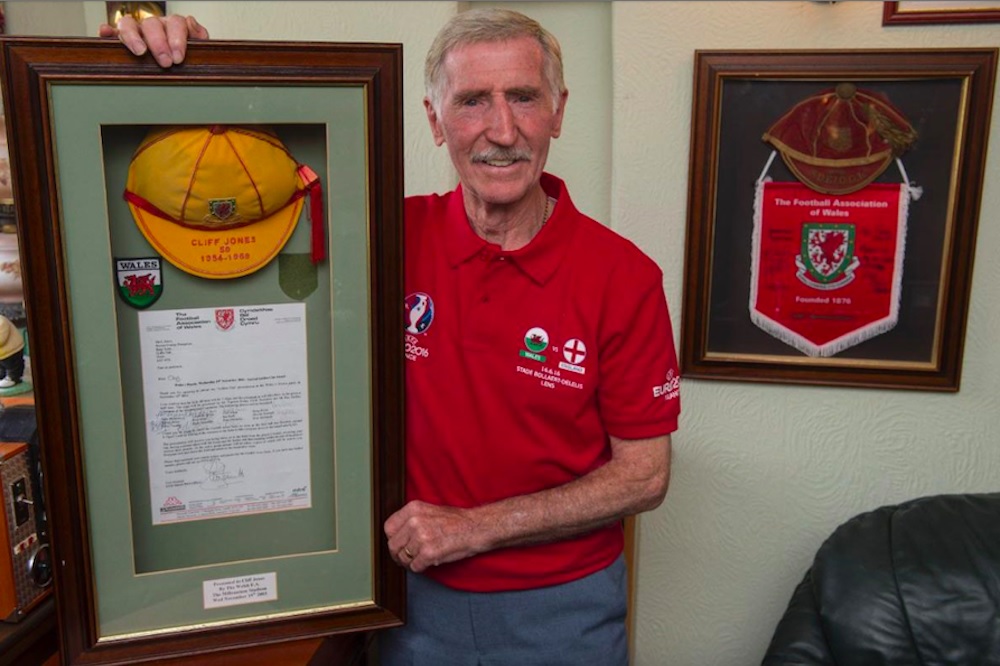
Christopher Evans
Wales head into their decisive World Cup semi-final qualifying match against Austria this month with hopes of emulating the famous squad that made it to the finals in 1958.
Reaching the World Cup quarter-final in Sweden ranks as one of the greatest-ever achievements in Welsh football history. Similar to the situation they find themselves in for Qatar 2022, Wales had qualified for the tournament via the dreaded play-offs.
However, Wales’ appearance in the finals in ’58 occurred through somewhat farcical circumstances. Jimmy Murphy’s team, including star players such as Cliff Jones, Ivor Allchurch and John Charles, had initially failed in their qualification group. Pitched against a strong Czechoslovakian side and East Germany, Wales finished second in a group where only the winners would qualify for the finals. Despite beating both teams at home, including a 4-1 drubbing of East Germany, Wales lost their away games (the three teams played each other home and away), allowing Czechoslovakia to top the group with six points.
Israel had somewhat bizarrely advanced from the CAF/AFC (The Confederation of African Football and the Asian Football Confederation, respectively) qualification zone without kicking a ball, with opposition teams refusing to play them for a variety of reasons. Turkey had withdrawn in protest at being placed in the Asian qualifying groups (Israel had also been placed in the Asian groups), on-going political issues in Indonesia meant that they refused to play unless the match took place on a neutral ground, and Sudan declined to play due to the Arab League boycott of Israel.
FIFA decided to create a rule stipulating that a team could not qualify for the World Cup without playing a match, thus organising a two-legged play-off where a second-placed team from the European groups would face Israel.
Legend has it that the draw took place from the famous Jules Rimet trophy itself, with Belgium being pulled out first. To add to the absurdity, Belgium decided against participating due to the politics of the situation, meaning the team who were second out – Wales – would meet Israel in Ramat Gan for the first leg.

Welsh legend Cliff Jones says the squad were just relieved to be given a second chance. “Initially we were very disappointed. It is the biggest and best football tournament in the world – it’s the World Cup. As a player you want to play at the top level, and we thought we’d missed out.”
The winger, who was part of the famous double-winning Spurs team of 1960/61, says that the politics involved didn’t affect the Welsh squad. “We were aware of what was going on, but not really bothered. As footballers we weren’t generally political people and we didn’t really understand too much about it. But of course, it was an opportunity for us when all those teams dropped out against Israel. Nobody wanted to play them. Our players just wanted to play football, that’s all they wanted to do. We used it as an opportunity of going further in the competition and hopefully getting to the World Cup in Sweden.”
Cliff, who turned a sprightly 87 in February, says that there was an excitement in the lead up to the play-off games.
“We had been given a second chance to play at the World Cup, it was very lucky. But we weren’t nervous about the games, it was more excitement. It was something that we took on board and we just wanted to get further. We knew we were a good team and that we could progress.”
The first leg in Israel (15th January 1958)
Wales travelled to Israel without much fuss. Wales’ talismanic striker John Charles had made his own way over from Italy, where his club Juventus had reluctantly released him for the double-header.
Jones has high praise for Il Gigante Buono (The Gentle Giant), who he says is the best player he has ever played alongside.
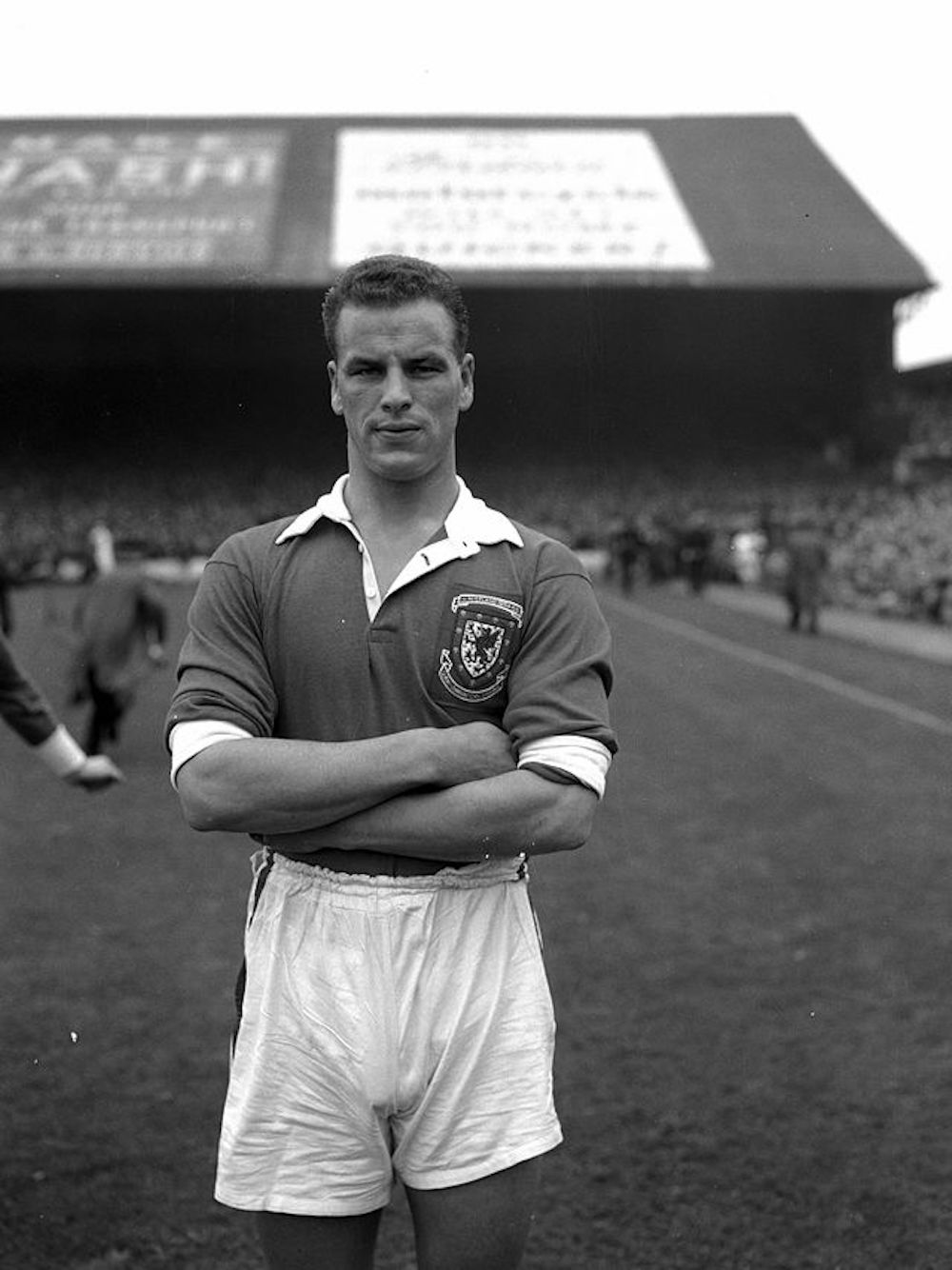
“Everything was special about him. He could play centre-forward or centre-half. When he went to Italy, he played centre-forward for Juventus. People used to ask me what is his best position was – centre-forward or centre-half? I used to say ‘well, I don’t know what his best position is – but he’s the best centre-half I’ve ever seen, and he’s the best centre-forward I’ve ever seen.’ He was just a different class.”
Cliff thinks that Charles is up there with the best of all time. “People mention Puskás, Pelé, Eusébio and Stanley Matthews – but you’ve got to put John Charles in there as well. He was special. They called him the Gentle Giant, but I’ll tell you what, you wouldn’t mess with him.”
The Ramat Gan stadium in the Tel Aviv District was to host the match versus Israel, though it was more half building site, half football ground. Cliff doesn’t recall too much of the first leg but does remember that the match was played in searing temperatures.
Few Wales fans had travelled to Israel for the match, although 90 Welsh servicemen had flown from a military base in Cyprus to watch their beloved fatherland. A somewhat laughable mistake in preparation meant that Wales arrived in Israel without a ball, meaning that the players had to focus solely on the fitness element of training.
Football boots
It’s not the first-time mishaps had dogged the Welsh team throughout its tumultuous history. Cliff recalls a personal mishap that occurred before one of the highlights of his career – scoring the winning goal in a 2-1 victory over England at Ninian Park on 22nd October 1955.
“I’ve got a story about that Home Championship game. I was still working at the Dry Docks in Swansea and was looking after my own kit and gear. Before the game, I was trying to get ready and realised that I had forgotten my football boots. I got in touch with my wife Joan to ask her to bring my boots to the stadium. I kept checking the front office to see if Joan had arrived and the manager said ‘its 2:15pm now, start getting yourself changed, stop going back and forth. If you’ve got any tickets just leave them at the office and they’ll give them to your wife.’
“I said ‘it’s not the tickets boss, she’s got my football boots.’ He said ‘What!? We’re playing against Tom Finney and Stan Matthews, and you’ve forgotten your f-ing boots?’ Joan eventually came to the stadium and passed them through the front office to me. So, Joan saved my life.”
Cliff laughs: “Whenever I played for Wales again and Jim (Jimmy Murphy) was the team manager, the first thing he would say to me when I arrived was ‘have you got your boots’?”
In Israel, Wales needn’t have worried about the absence of their ball, the first leg finished 2-0 to the away side in front of nearly 55,000 fans. Cliff’s Spurs teammate and good friend to this day Terry Medwin set up Ivor Allchurch for the opener, who finished with aplomb from the edge of the area after 38 minutes. This finish was matched by Arsenal’s Dave Bowen in the 63rd minute, allowing Wales to take a healthy lead back to Cardiff for the return match.
The second leg in Cardiff (5th February 1958)
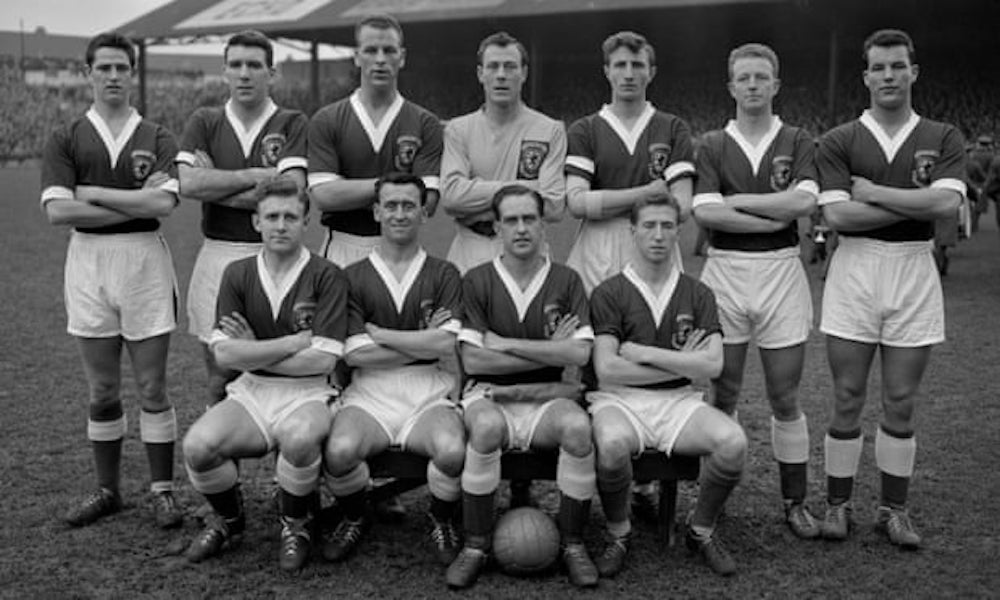
Ninian Park was packed to the rafters for the return leg on 5th February 1958. “The atmosphere in Cardiff was brilliant, just electric,” Cliff recalls. “The fans were, as all Welsh fans always are, fantastic.”
Wales dominated the game, the busy Israeli goalkeeper Ya’akov Hodorov putting in a fine display. Unfortunately for Hodorov, his heroic performance was marred by a nasty injury, the keeper receiving a broken nose and concussion in a collision with John Charles. With no substitutes available, the disorientated goalie soldiered on to finish the rest of the game. However, he would apparently wake up later in hospital in Cardiff speaking Hebrew and under the impression that he was still in Israel.
Photos from the second leg at Ninian Park (Credit: @OldFootball11)
Israel’s tough-tackling approach to the game had managed to keep the home side at bay until Allchurch struck from a tight angle in the 76th minute. Wales continued to press and a stellar performance from Medwin was capped off when he created the second goal, after a missed chance by Charles fell to Jones who finished confidently.
Cliff says although he has fond memories of the celebrations after the match, they were short-lived. “We just had a nice cup of tea (laughs). Seriously though, there were certainly great celebrations in the dressing room, and we would’ve had a few drinks together afterwards. It was brilliant that we were going to the World Cup. But our celebrations were short-lived because of the Munich Air Disaster.”
This hit even closer to home for Cliff, his teammates, and particularly Wales manager Jimmy Murphy. Murphy was also the assistant to Manchester United manager Matt Busby, whose “Busby Babes” had flown to Belgrade for a European match. Busby had insisted that Murphy be with Wales for their play-off, meaning that he missed the trip and that fateful flight home on 6th February 1958. 23 people, including eight Manchester United players, lost their lives in Munich.
“That is fate isn’t it?”, laments Swansea-born Cliff. “Jimmy would’ve been on that plane. Life can be very strange at times. Certainly, it was with Jimmy’s experience.”
As Cliff’s voice trails off, the conversation returns to the World Cup in Sweden, where he says he came across the best footballer to have lived.
“I played against Pelé at the World Cup. Brazil had Garrincha, Didi, Vava – they were the ones that everyone was talking about. Nobody mentioned Pelé. He was 17 and he had only made a few appearances for Brazil. I can vividly remember our game against them. He picked the ball up in his own half in the early part of the game, went past three Welsh defenders and smacked a shot at (Welsh keeper) Jack Kelsey, who just managed to tip it over. I looked back and there were three Welsh defenders on their arses. It was just this young kid, 17 years of age, but it was Pelé! Of course, he went on to become, in my opinion, the greatest footballer there ever has been or ever will be. I think I played against him three times. Special moments.”
Wales eventually went out in that quarter-final match against Brazil, the young Pelé ending “the golden generation’s” impressive performance in Sweden.
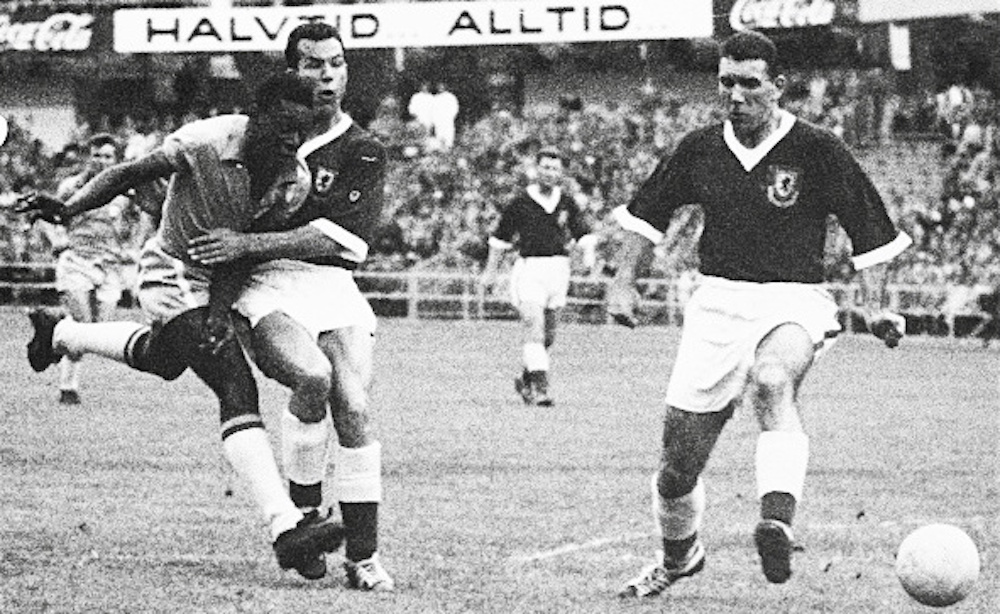
Although Cliff says his experience at the World Cup was special, his favourite memory is from that infamous match where he forgot his boots.
“It was my second international game and it was against England. They had the likes of Stanley Matthews, Nat Lofthouse and Tom Finney. We won 2-1 and I got the second goal. It was at the Canton Road End. Roy Paul got the ball on the right side and whipped it in. I came in from the left and got above the defenders and cracked in a great header past (England keeper) Bert Williams. He had no chance. It was a perfect header and we were two up and out of sight. It’s probably my greatest moment in football.”
An unfortunate own goal from John Charles gave England some hope, but Wales held on for the victory to the delight of an ecstatic Welsh crowd.
“I can remember at the end of the game all the supporters came on and carried me off. I’m Welsh through and through and putting that Welsh shirt on was always something special for me. Scoring what was essentially the winning goal against England too. It doesn’t get much better than that in football. My dream fulfilled.”
The amiable and perpetually cheerful Jones, who was still only 20 and working in the local Steelworks in Swansea, fondly remembers the day after the game.
“My father Ivor, who had also been a professional footballer, had no other skills after he retired and finished working in the local steelworks in Cwmfelin.
He had said to me ‘you need to learn yourself a trade son’. So, at the time I scored that goal against England, I was serving a five-year apprenticeship as a sheet metal worker over the Prince of Wales Dry Dock in Swansea. On the Monday morning after scoring the winning goal against England at Ninian Park, I clocked on at 7:30am. As I walked in, all my workmates were there and they gave me a massive cheer. It was an unbelievable moment, something I’ll never forget.”
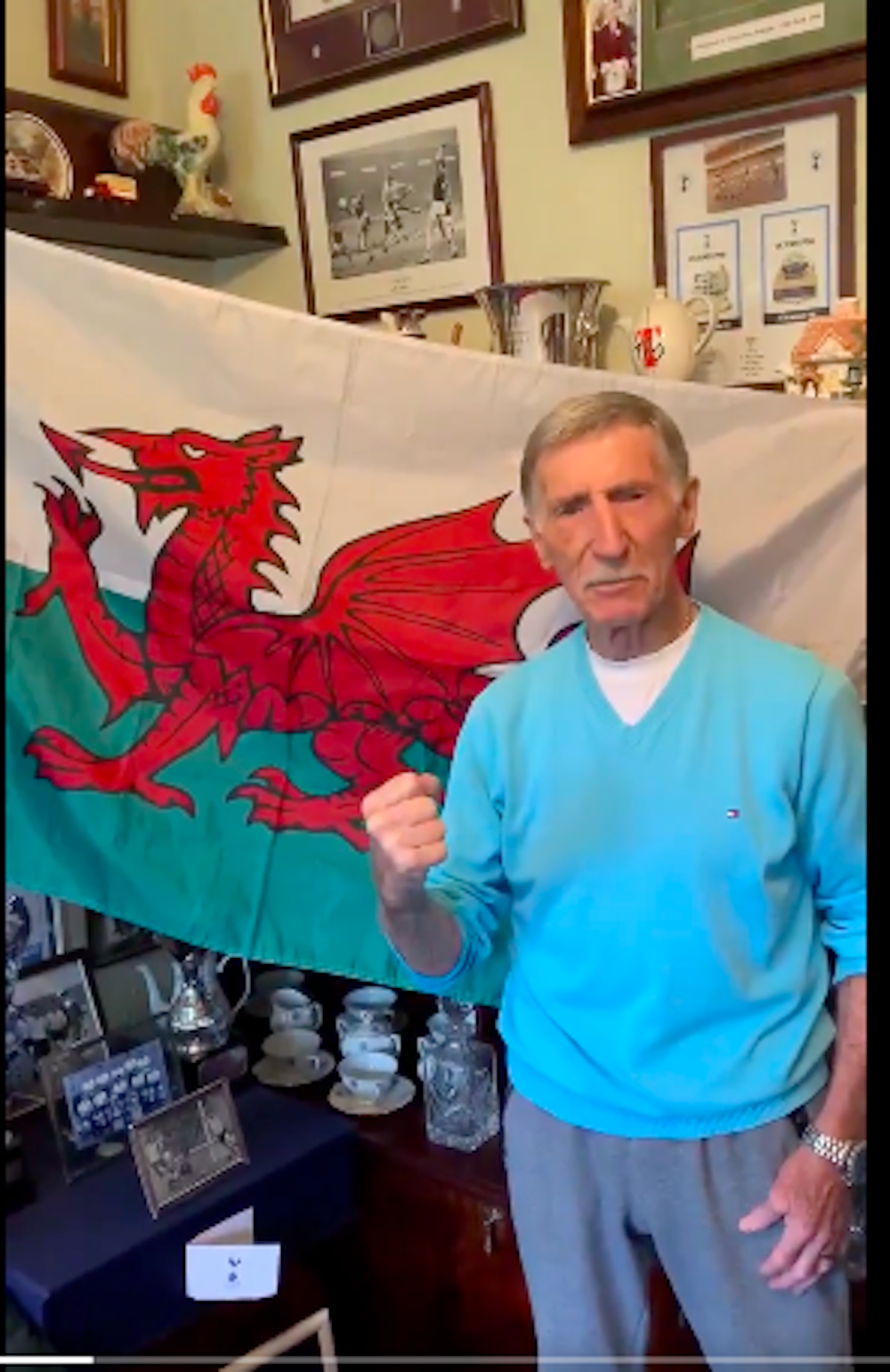
As the current golden generation aim to qualify for the World Cup this November, Cliff is confident that Bale and co can progress, especially with two potential home games at Cardiff City stadium.
“I think they have every chance. It’s at Cardiff City Stadium, which is essentially the same place as Ninian Park really, they’ve just changed the name. I’m sure the lads have got the same feelings about Wales as we did, being proud Welshmen. Putting on that Welsh shirt for me was a huge honour. I am sure they are going to make it very difficult for Austria. I’m going for a nice Wales win.”
The Wales star recently celebrated his 87th birthday and is still in remarkable shape, posting videos of himself doing press-ups and scooting on his Twitter account.
Still got the balance!! #coys pic.twitter.com/hom93fPKeK
— Cliff Jones (@Cliff_Jones11) January 31, 2022
Cliff’s optimistic and buoyant personality is infectious. If Wales approach their generation-defining match against Austria with such vigour, the Red Wall may be able to look forward to a very special Middle Eastern adventure.
Cliff is a Patron for Saint Francis Hospice. Visit: http://www.sfh.org.uk/ for more information
Support our Nation today
For the price of a cup of coffee a month you can help us create an independent, not-for-profit, national news service for the people of Wales, by the people of Wales.





